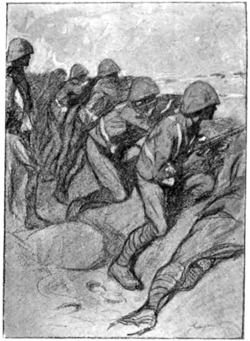of lead. It was singing a mechanical little ditty to itself, "Tuf-tuf, tuf-tuf, tuf-tuf," and squirting out little jets of steam behind. It had humped itself up, as a limpet does before it crawls; it had lifted its skirt and displayed along the length of it—feet! They were thick, stumpy feet, between knobs and buttons in shape—flat, broad things, reminding one of the feet of elephants or the legs of caterpillars; and then, as the skirt rose higher, the war correspondent, scrutinizing the thing through his glasses again, saw that these feet hung, as it were, on the rims of wheels. His thoughts whirled back to Victoria Street, Westminster, and he saw himself in the piping times of peace, seeking matter for an interview.
"Mr.—Mr. Diplock," he said; "and he called them Pedrails . . . Fancy meeting them here!"
The marksman beside him raised his head and shoulders in a speculative mood to fire more certainly—it seemed so natural to assume the attention of the monster must be distracted by this trench before it—and was suddenly knocked backwards by a bullet through his neck. His feet flew up, and he vanished out of the margin of the watcher's field of vision. The war correspondent grovelled tighter, but after a glance behind him at a painful little confusion, he resumed his field-glass, for the thing was putting down its feet one after the other, and hoisting itself farther and farther over the trench. Only a bullet in the head could have stopped him looking just then.

"The men about him stuck to their position and fired furiously."
The lean man with the strident voice ceased firing to turn and reiterate his point. "They can't possibly cross," he bawled. They"
"Bang! Bang! Bang! Bang!"—drowned everything.
The lean man continued speaking for a word or so, then gave it up, shook his head to enforce the impossibility of anything crossing a trench like the one below, and resumed business once more.
And all the while that great bulk was crossing. When the war correspondent turned his glass on it again it had bridged the trench, and its queer feet were rasping away at the farther bank, in the attempt to get a hold there. It got its hold. It continued to crawl until the greater bulk of it was over the trench—until it was all over. Then it paused for a moment, adjusted its skirt a little nearer the ground, gave an unnerving "toot, toot," and came on abruptly at a pace of, perhaps, six miles an hour straight up the gentle slope towards our observer.
The war correspondent raised himself on his elbow and looked a natural inquiry at the artist.
For a moment the men about him stuck to their position and fired furiously. Then the lean man in a mood of precipitancy slid backwards, and the war correspondent said "Come along" to the artist, and led the movement along the trench.
As they dropped down, the vision of a hillside of trench being rushed by a dozen vast cockroaches disappeared for a space, and
